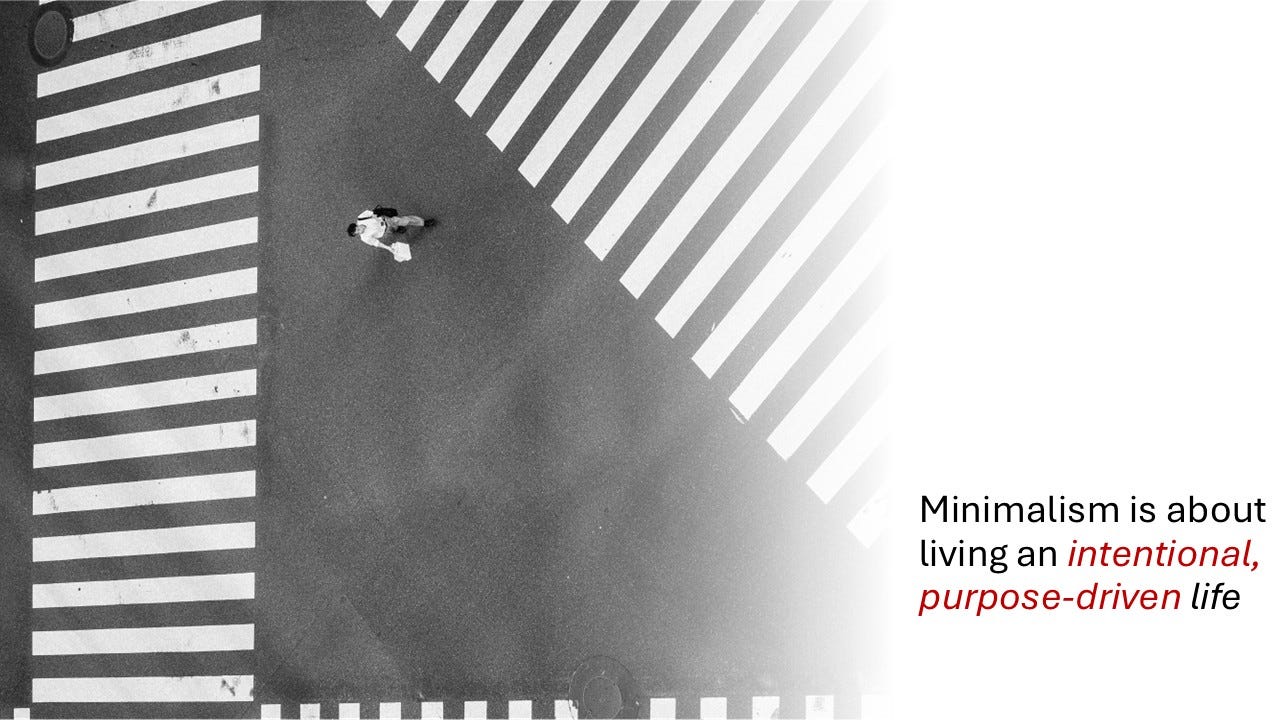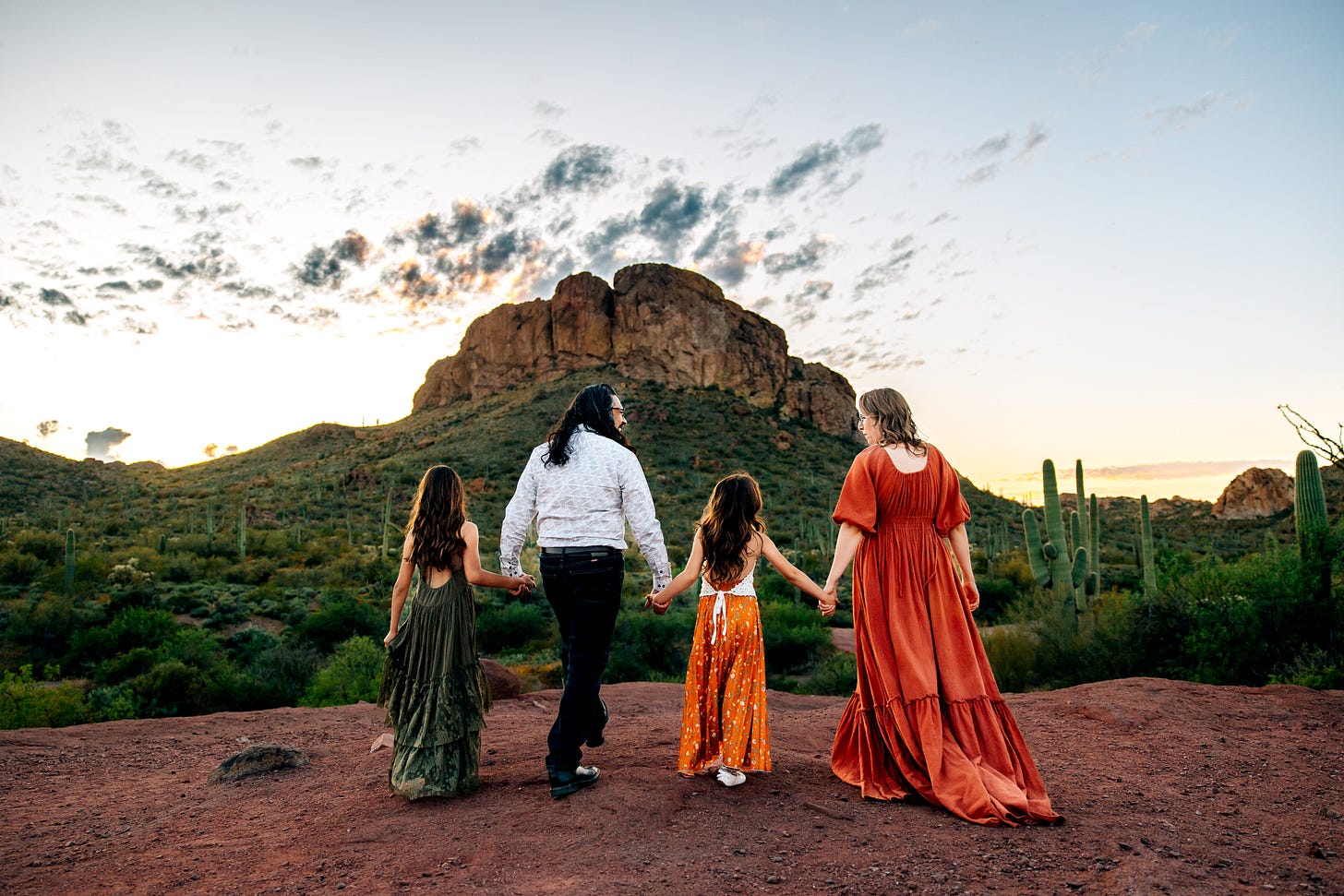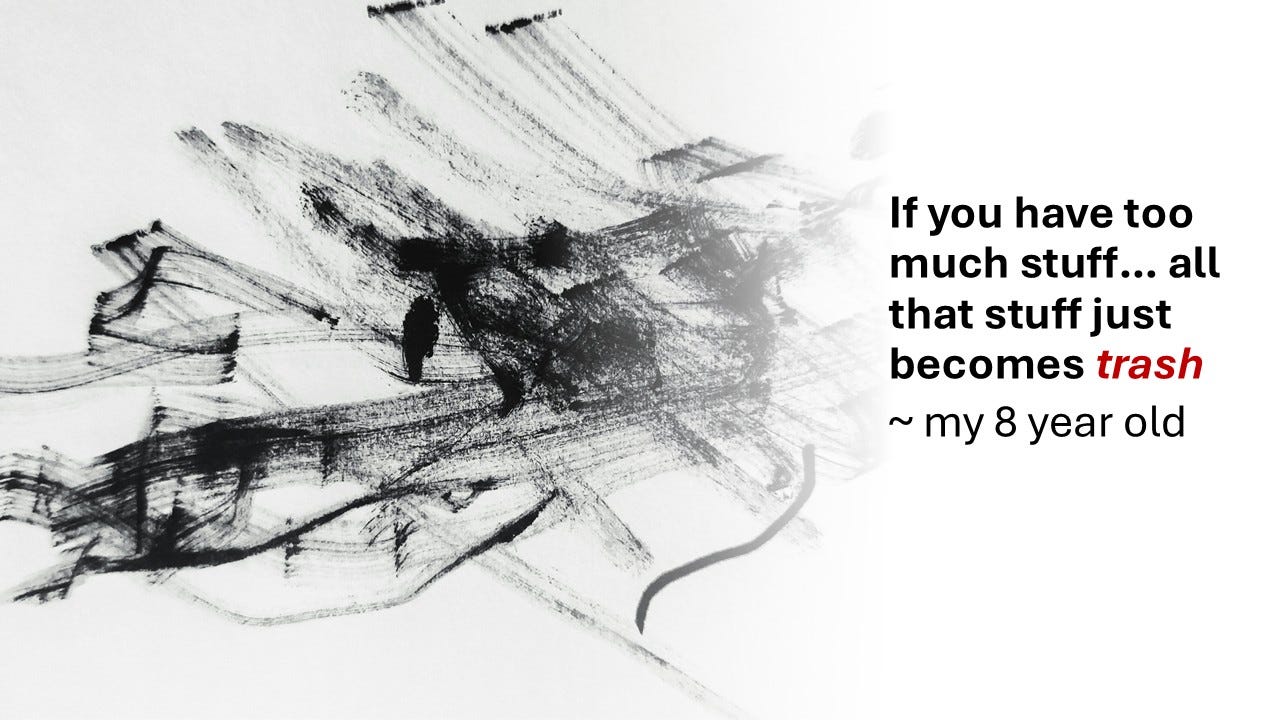✨Less Stuff Made My Kids Happier
A Step-by-Step Guide to Teaching Kids to Thrive with Less
I remember the exact moment we decided something had to change.
I remember the road we were on, the way the sun hit the windshield, the sound of my daughter screaming in the backseat.
But mostly, I remember how it felt - like we were suffocating.
We were driving to drop my one year old off at daycare - a commute that took us 45 minutes… on a good day. We had to leave precisely at 6:50am or it would take an hour instead. After we dropped her off, we’d still have another 15 mins to my office and yet another 15 minutes for my husband. We never had time to eat breakfast so our Costco-bought, bulk smoothies sat between us. Our one year old was crying in the backseat. I’m not exaggerating when I say that she cried nearly non-stop, both ways … every…. single…. day…. I was 10 weeks pregnant with our second.
I turned to my husband and said: How are we going to do all of this AND a baby?
It wasn’t just the commute. We were in a house that was too big for us. A house we somehow had to clean and maintain while both of us were working full-time, commuting 2 hours a day, with a toddler who couldn’t be left alone. I had just started my job as a tenure-track professor, my husband had just switched to a new job as a consultant. We had just moved across the country. We had no friends, no community, and no family close by. To say we were drowning is an understatement.
So we did the unimaginable. We moved out of our dream house with the swimming pool, view of mountains, nearby hiking trails and moved into a tiny apartment next to my daughter’s daycare.
Everyone told us we were crazy: You can’t raise kids in a tiny apartment!
But the thing was - we needed LESS - a LOT less.
More importantly, we needed to focus on what was was ACTUALLY important - our growing family. Not cleaning, not commuting… our sweet little family.
It wasn’t easy. We felt alone, confused, and totally terrified.
Then, we found minimalism.
To those with only a cursory knowledge of minimalism this might not make sense. How does throwing out stuff, fix anything?
But the thing is minimalism isn’t about decluttering— it’s about living an intentional, purpose-driven life focused on what gives your life meaning. In our case, our family.
Minimalism was hard at first. It’s difficult to realize that memories don’t exist in things. I don’t need to keep a pair of jeans that reminds me of that time my best friend and I were shopping in Nashville. I still have that memory - without the jeans. My kids don’t need all the toys, stuffed animals, and stuff to feel loved… they need more purposeful time with me. We certainly didn’t need all the fancy furniture that was all going to get ruined anyways.
Minimalism gave us a name to the philosophy that would infiltrate our lives and make us better parents. In hindsight, minimalism was a stepping stone to homeschooling.
Less stuff and a smaller house means that you spend less time cleaning and maintaining and more time snuggling your babies, reading to your children, fingerpainting, crafting, and cooking together.
It starts with getting rid of stuff, but ends with more of the most precious resource on the face of the planet — time.
But how do my kids feel about minimalism?
Truth be told, my kids are HAPPIER with less stuff.
They don’t like it when we minimize the stuff in their room. But immediately after, they are happier, more playful, & calm. All around better humans.
My kids make a lot of their own toys which accumulate over time, as does their art. So despite minimalism, decluttering is still a part of our lives.
Below is a recording with my 8 year old where we talk about how she felt after a recent declutter. I ask her at the end which would she rather have more toys or a trip as a family. Guess which she picked? What do you think YOUR kid would pick - I bet they pick more time with you. Note: my husband is from India, they call him Appa which means Dad in Tamil. I start every audio with my kids’ laughter so enjoy.
Still, teaching kids to focus on experiences and family over stuff doesn’t happen overnight.
There’s something deeply instinctual about keeping things.
Our brains are wired to keep things in case of famine or hard times. This instinct is played out hard in our children. Young children especially haven’t become accustomed to abundance.
Thus, when talking about cleaning up messy rooms and dealing with kids’ desires to keep EVERYTHING - even stuff that is obviously trash to you, we have to consider that you are fighting against a primal instinct that kept you and your children alive in past generations.
Just like babies have a primal instinct to be near a parent at all times, kids have an instinctual need to keep stuff.
So, how do we train kids not to keep all the things?
Carefully, slowly, and with a recognition that it’s something that goes against their innate instincts.
Today, I’ll break down how we gently taught our kids minimalism. You’ll learn👇
The easy decluttering rules we've used as a family
How to introduce minimalism by age — from toddlers to tweens
Ways to shift your home culture away from stuff and toward connection
Tips for getting friends and family on board with experience-based giving
And a step-by-step framework to create a home that feels lighter, happier, and more intentional
Become a paid subscriber for access. The annual membership is on sale for the summer $5/month — cheaper than one (1!) box of crayons.




